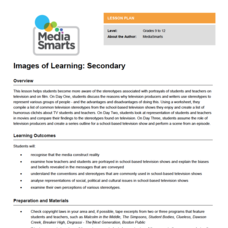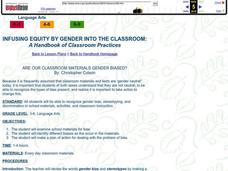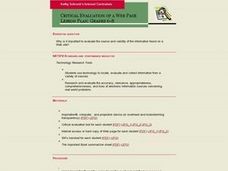Curated OER
History's Mysteries Lesson Plans
By exploring history's mysteries, like Stonehenge, students can learn about historical research.
Media Smarts
Images of Learning: Secondary
Make your scholars more aware of stereotypical portrayals in film and television. Discuss the definition of "stereotypes" and how they are used to present a story. High schoolers look at specific television shows and complete a chart...
American Statistical Association
Chocolicious
To understand how biased data is misleading, learners analyze survey data and graphical representations. They use that information to design their own plans to collect information on consumer thoughts about Chocolicious cereal.
Curated OER
Using Random Sampling to Draw Inferences
Emerging statisticians develop the ability to make inferences from sample data while also working on proportional relationships in general. Here, young learners examine samples for bias, and then use random samples to make...
Anti-Defamation League
Soccer, Salaries and Sexism
Call it soccer, call it football, but call it unfair! the US women's soccer team has called out the US Soccer Federation for unfair treatment in terms of salaries, support, and working conditions in a lawsuit filed in 2019. Young...
Curated OER
Are Our Classroom Materials Gender Biased?
Students explore equality by analyzing their own classroom belongings. In this gender bias lesson, students investigate their classroom and identify objects as either male or female biased. Students collaborate while exploring the idea...
Curated OER
Can You Detect Bias?
Eleventh graders recognize some, but not all ethical processes (e.g., independent verification, clarifying assumptions, disclosing conflicts of interest) that shape scientific endeavors. Students build awareness of how various sources...
Curated OER
Teaching With Documents Lesson Plan: Images of the American Revolution
Learners interpret historical evidence presented in primary and secondary resources. In this American Revolution lesson plan, students examine international involvement in the war as well as major events of the war.
Curated OER
Bias vs. Perspective: An Inevitable Aspect of Journalism?
Students explore the types of media that U.S. teens prefer the ways in which viewers identify and account for journalistic bias. They explore the ways in which media shapes one's opinion or affects their judgment.
Curated OER
Quality of Information: Point of View and Bias
Fifth graders identify stereotypes of Indian people based on perceived characteristics. They discuss the misconceptions. Students define quality of information and give an example from the story "Seaman's Journal: On The Trail With Lewis...
Walters Art Museum
The Symbolism of Allegorical Art
Introduce learners to allegorical art with four bronze sculptures by Francesco Bertos. After modeling how to recognize bias and allegory in Bertos' Africa, class groups examine the other three sculptures in the series before creating...
Anti-Defamation League
What Is Culture?
Explore the complexity of culture with this rich and comprehensive lesson plan, which will prompt your learners to think critically and respectfully discuss our current definitions of culture, and how those definitions might...
Middle Tennessee State University
John Brown: Hero or Villain?
"Love it or leave it." "You're either for us or against us." Rhetoric and it's polarizing effects are the focus of a lesson that uses John Brown's attack on Harper's Ferry as an exemplar. Groups examine primary source documents,...
National Woman's History Museum
Breaking Through Gender Roles: The Women of NASA
Whether recognized or not, extraordinary women were integral to breaking gender barriers and putting Americans into space. For Women's History Month, explore a series of video clips and biographical information that profile these...
Curated OER
Conflict Resolution Lesson Plan
Fourth graders investigate conflict and social justice. In this conflict resolution instructional activity, 4th graders consider conflicts they have experienced and think about how they could have applied conflict resolution strategies...
Curated OER
Critical Evaluation of a Web Page Lesson Plan
Young scholars research and examine importance of evaluating source and validity of information found on a web site.
Curated OER
Persuasive and Emotive Language Lesson Plan
Young scholars explore persuasive language. In this emotive language lesson, students consider the use of language that incites readers as they participate in reading and writing activities that require them to describe a tourist...
Curated OER
First Nations in the Media
Students analyze the portrayal of Aboriginal people in the media. In this stereotype identification instructional activity, students investigate the ways the media represents Aboriginal culture. Students use the Internet to...
Curated OER
Cleveland May Gamble on Gambling
Students read articles, both pro and con, about a city proposing to approve gambling. They discuss the biases of the articles then interview parents and community members about the issue. They work in small groups to develop either a pro...
Los Angeles Unified School District
Capitalism and Socialism
Capitalism, socialism, communism ... these may seem like a whole bunch of isms to your scholars. High schoolers won't confuse them after completing an informative resource. Your class masters how to use primary sources to...
Alabama Learning Exchange
Abundant Area
Explore the relationship between perimeter and area. Learners input the area and perimeter for shapes on the Shape Explorer website, solve problems using geoboards, complete a worksheet, create a PowerPoint presentation, and take an...
Anti-Defamation League
Nothing Wrong with a Three-Legged Dog: Discussion Guide for Grades 3-5
Scholars study the book, Nothing Wrong with a Three-Legged Dog by Graham McNamee to encourage an antibullying trend in their school and community. Chapters and themes examine bias, coping skills, how to respond to bullying, and being a...
American Press Institute
In the Newsroom: The Fairness Formula
Reporting the news is easy, right? Think again! Show young scholars the difficult choices journalists make every day through a lesson that includes reading, writing, and discussion elements. Individuals compare the language and sources...
Media Education Lab
Propaganda Techniques
In an age of fake news, alternative facts, and biased reporting, it is more important than ever that 21st century learners develop the critical-thinking skills necessary to recognize, analyze and resist the propaganda techniques used in...

























